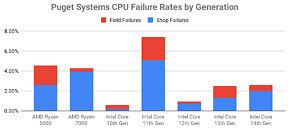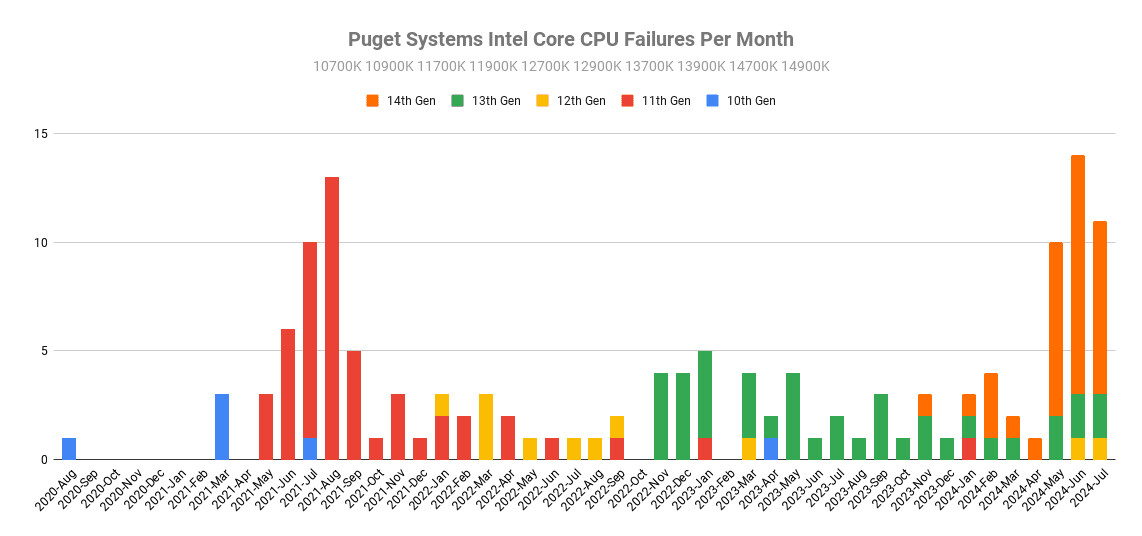- Joined
- Aug 19, 2017
- Messages
- 2,749 (1.01/day)
A fleet of recent reports have highlighted stability issues affecting Intel's 13th and 14th-generation desktop processors, raising concerns among consumers and industry professionals. The problem, which has gained significant attention over the past few months, is related to the processors' physical degradation over time. Custom PC builder Puget Systems has shared insights from its experience with these processors, revealing a nuanced perspective on the issue. While it has observed an increase in CPU failures, particularly with the 14th-generation chips, its failure rates remain notably lower than those reported by some game development studios and cloud gaming providers, who have cited failure rates as high as 50%. An interesting observation is that Puget Systems recorded a higher failure rate with AMD Ryzen 5000 and Ryzen 7000 series than Intel's 13/14th generation, with most failures happening at Puget's shop rather than the "field" in customers' hands.
Puget Systems attributes their more modest failure rates of Intel processors to their conservative approach to power management settings. By adhering strictly to Intel's specifications and developing their own power settings that don't hurt performance, they've managed to mitigate some of the stability issues plaguing other users. Intel has acknowledged the problem and announced plans to release a microcode patch by mid-August, with extended warranty program. This update is expected to prevent further degradation but may not reverse existing damage. Despite the elevated failure rates, Puget Systems' data shows that the issue, while concerning, still needs to be at critical levels for their operations. The company reports that failure rates for 13th and 14th gen Intel processors, while higher than ideal, are still lower than those they experienced with Intel's 11th gen chips and some AMD Ryzen processors. In response to the situation, Puget Systems is taking several steps, including maintaining its current power management practices, promptly validating Intel's upcoming microcode update, and extending warranties for affected customers. Below, you can see failure rates by month, by Intel's Core generation, as well as by "shop" vs "field" testing.



View at TechPowerUp Main Site | Source
Puget Systems attributes their more modest failure rates of Intel processors to their conservative approach to power management settings. By adhering strictly to Intel's specifications and developing their own power settings that don't hurt performance, they've managed to mitigate some of the stability issues plaguing other users. Intel has acknowledged the problem and announced plans to release a microcode patch by mid-August, with extended warranty program. This update is expected to prevent further degradation but may not reverse existing damage. Despite the elevated failure rates, Puget Systems' data shows that the issue, while concerning, still needs to be at critical levels for their operations. The company reports that failure rates for 13th and 14th gen Intel processors, while higher than ideal, are still lower than those they experienced with Intel's 11th gen chips and some AMD Ryzen processors. In response to the situation, Puget Systems is taking several steps, including maintaining its current power management practices, promptly validating Intel's upcoming microcode update, and extending warranties for affected customers. Below, you can see failure rates by month, by Intel's Core generation, as well as by "shop" vs "field" testing.



View at TechPowerUp Main Site | Source











